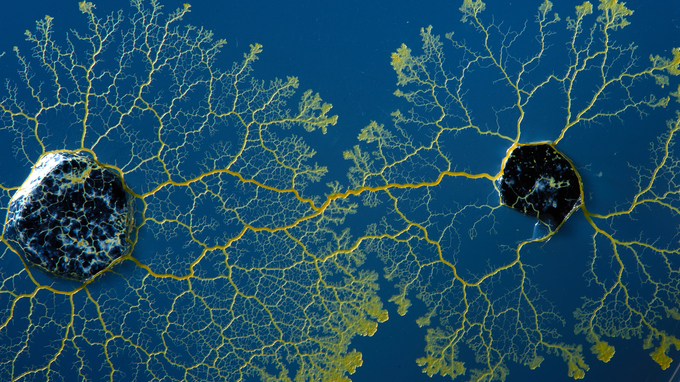Prof. Karen Alim erhält internationalen Forschungspreis
Renommierter Grant des Human Frontier Science Program für Biophysikerin
2021-04-29 – Nachrichten aus dem Physik-Department

Die Biophysikerin untersucht am Beispiel des einzelligen Schleimpilzes Physarum polycephalum die Frage, wie einfache Organismen in komplexen Umgebungen erfolgreich sein können. Das als einzige, riesige Zelle aufgebaute Lebewesen kann Millionen von Zellkernen beherbergen. Vereinigen sich zwei Organismen, laufen komplizierte Interaktionen auf Kernebene ab, die sogar zu einem selektiven Töten bestimmter Zellkerne führen können. Das gemeinsame Zytoplasma, also die Grundsubstanz der Zelle, verbreitet Ressourcen und Informationen, so dass die gesamte Zelle etwa eine Resistenz gegen Antibiotika entwickeln kann, obwohl nur ein kleiner Teil der Zellkerne die Resistenzgene in sich trägt.
An der Schnittstelle zwischen Physik, Evolutionsbiologie und angewandter Mathematik wollen Karen Alim und ihr Team herausfinden, wie diese kooperativen und wettbewerbsorientierten Dynamiken auf der Ebene der Zellkerne zu Verhaltensweisen des gesamten Organismus führen können. Dem vom HFSP ausgezeichneten Team gehören neben Alim der Mathematiker Marcus Roper, University of California, Los Angeles, und der Biologe Daniel Rozen, Universität Leiden, Niederlande, an.
„Viele Zellkerne in einem gemeinsamen Zytoplasma kommen viel häufiger vor als man allgemein annimmt, zum Beispiel in der Tumorentwicklung oder in der Plazenta,“ sagt Karen Alim, „wir hoffen an Physarum polycephalum zu lernen, wie die Kerne miteinander konkurrieren oder zusammenarbeiten um als einzelne Zelle Erfolg zu haben.“
Das internationale Human Frontier Science Programm unterstützt hoch innovative und riskante Grundlagenforschung zu grundlegenden biologischen Problemen, wobei der Schwerpunkt auf neuartigen und interdisziplinären Ansätzen liegt, die den wissenschaftlichen Austausch über nationale und disziplinarische Grenzen hinweg beinhalten. Das Programm genießt unter Wissenschaftlern einen exzellenten Ruf, die Konkurrenz ist hoch: In diesem Jahr wurden 21 Forschungsprojekte aus 71 Anträgen zur Förderung ausgewählt. Zunächst hatten 551 Forschungsteams Voranträge abgegeben.
Bewerben können sich Wissenschaftlerteams aus verschiedenen Kontinenten, die ihre Expertise zu Fragestellungen kombinieren wollen, welche von einzelnen Laboren nicht beantwortet werden können. Die Beteiligung von Wissenschaftlern aus Fachrichtungen außerhalb der traditionellen Lebenswissenschaften ist dabei ausdrücklich erwünscht. Das Programm wird finanziell getragen von den Regierungen oder Forschungsagenturen Australiens, Kanadas, Frankreichs, Deutschlands, Indiens, Israels, Italiens, Japans, der Republik Korea, Neuseelands, Singapurs, der Schweiz, Großbritanniens, der USA sowie der Europäischen Union.
Verwandte Meldung
- Ein Gedächtnis ohne Gehirn – 2021-02-22
- ERC fördert zukunftsweisende Projekte – 2020-09-25